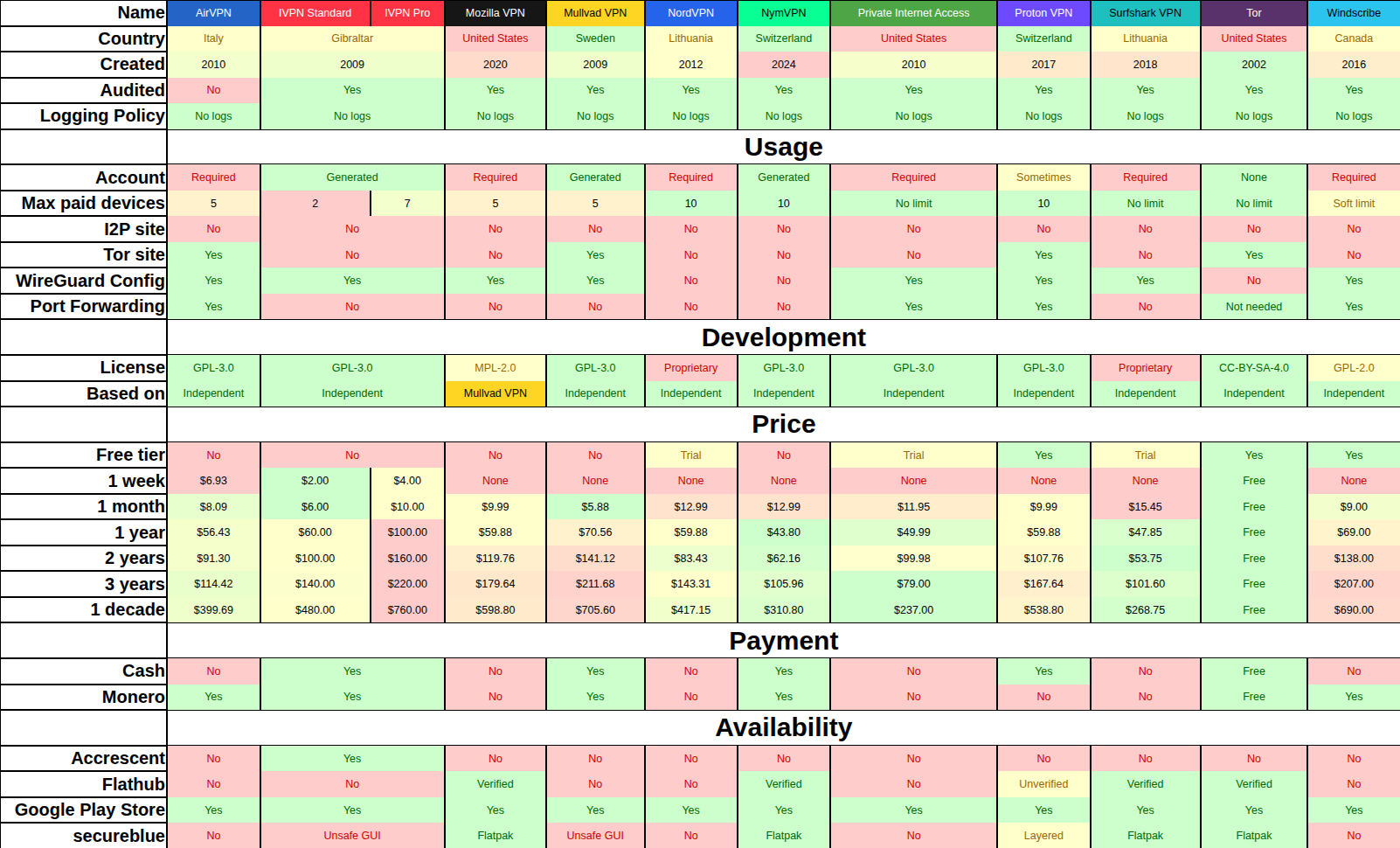- cross-posted to:
- privacy@lemmy.ml
- cross-posted to:
- privacy@lemmy.ml
cross-posted from: https://lemmy.ml/post/37366040
After making a post about comparing VPN providers, I received a lot of requested feedback. I’ve implemented most of the ideas I received.
Providers
- AirVPN
- IVPN
- Mozilla VPN
- Mullvad VPN
- NordVPN
- NymVPN
- Private Internet Access (abbreviated PIA)
- Proton VPN
- Surfshark VPN
- Tor (technically not a VPN)
- Windscribe
Notes
- I’m human. I make mistakes. I made multiple mistakes in my last post, and there may be some here. I’ve tried my best.
- Pricing is sometimes weird. For example, a 1 year plan for Private Internet Access is 37.19€ first year and then auto-renews annually at 46.73€. By the way, they misspelled “annually”. AirVPN has a 3 day pricing plan. For the instances when pricing is weird, I did what I felt was best on a case-by-case basis.
- Tor is not a VPN, but there are multiple apps that allow you to use it like a VPN. They’ve released an official Tor VPN app for Android, and there is a verified Flatpak called Carburetor which you can use to use Tor like a VPN on secureblue (Linux). It’s not unreasonable to add this to the list.
- Some projects use different licenses for different platforms. For example, NordVPN has an open source Linux client. However, to call NordVPN open source would be like calling a meat sandwich vegan because the bread is vegan.
- The age of a VPN isn’t a good indicator of how secure it is. There could be a trustworthy VPN that’s been around for 10 years but uses insecure, outdated code, and a new VPN that’s been around for 10 days but uses up-to-date, modern code.
- Some VPNs, like Surfshark VPN, operate in multiple countries. Legality may vary.
- All of the VPNs claim a “no log” policy, but there’s some I trust more than others to actually uphold that.
- Tor is special in the port forwarding category, because it depends on what you’re using port forwarding for. In some cases, Tor doesn’t need port forwarding.
- Tor technically doesn’t have a WireGuard profile, but you could (probably?) create one.
Takeaways
- If you don’t mind the speed cost, Tor is a really good option to protect your IP address.
- If you’re on a budget, NymVPN, Private Internet Access, and Surfshark VPN are generally the cheapest. If you’re paying month-by-month, Mullvad VPN still can’t be beat.
- If you want VPNs that go out of their way to collect as little information as possible, IVPN, Mullvad VPN, and NymVPN don’t require any personal information to use. And Tor, of course.
ODS file: https://files.catbox.moe/cly0o6.ods



Do yourself a favor. Get a Digital Ocean droplet for $6/mo, Debian version, follow their excellent step-by-step directions to install OpenVPN Server. Done.
You don’t have to know Linux, the instructions are tight. I only got hung on one step where they left a small thing out. Also, I was drunk. Got it going the next evening.
This thing has been running for years and years, can’t even remember how to log in, likely lost my SSH key. 🙄 No worries about logging. It’s yours, they can’t take it away or change the rules. It’s yours.
And BTW, not sure my rate has gone up in the ~7 years I had it. Maybe $1? That might have been because I enabled additional backups.
Bad take
There might be advantages too, but I can’t think of any unless you are gonna use the VPS for other stuff too and creating the vpn is basically free then (but I still wouldn’t do it personally).
This will only satisfy limited use cases. DO operates primarily in the US, and global region availability is limited to a handful of countries. People like to be able to change their VPN gateway country, something not easily supported in your setup.
I would not want my VPN to be hosted in the US, and not only because of trump.
Amsterdam (AMS3) is not in America, in case you missed that bit.
My data center is in Amsterdam (AMS3). What are you on about? No, you can’t flip your connection all over the globe, but it’s still outside of America.
Go with a commercial provider then. But don’t bitch about all the issues and risks.
Are you ok?
I honestly don’t know why you took that as bitching, I’m merely pointing out that your setup likely won’t satisfy the needs of many who are looking at VPN subscriptions. It’s great that it works for you, but several folks I know aren’t likely to (for example) maintain or provision a VPS over in the UK to use BBC iPlayer.